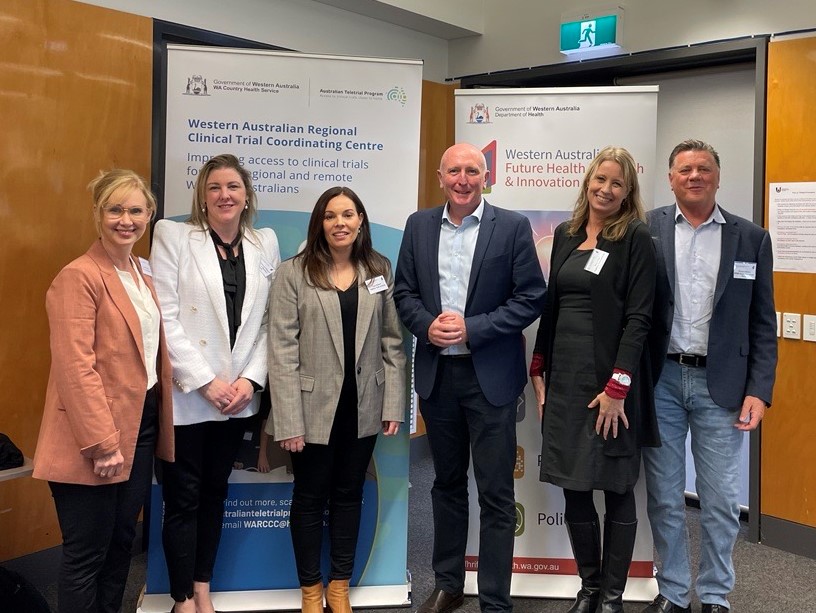L-R: Jackie Davis (ORIGINS), Rebecca Glauert (Raine), Dr Lisa GIbson (ORIGINS), Hon Stephen Dawson, Dr Nina D'Vaz (ORIGINS), Richard Marsh (Busselton Health Studies) at the announcement in Geraldton.
On 4 July, Hon Stephen Dawson MLC, Minister for Medical Research, announced the new WA Cohort Studies Research Project Support Program.
The launch of the program recognises the value and importance of the three major cohort studies in WA - The ORIGINS Project, The Raine Study and Busselton Health Study. It also acknowledges the contribution that cohort studies bring to the State and researchers around the world.
The Support Program, provided through the Future Health Research and Innovation (FHRI) Fund will provide research grants for population health research projects that have a clear hypothesis, methodology, and scientific protocol to obtain results utilising an established WA cohort study.
“Researchers will be able to apply through the scheme for a grant to conduct their research using data or samples from one of the three major cohorts in Western Australia,” Professor Desiree Silva, Director of The ORIGINS Project, said.
“Working with an established cohort study creates efficiencies which will allow WA medical researchers to save money and time while also allowing them to achieve outcomes earlier, translating health and medical research benefits sooner to the WA public.”
ORIGINS, Raine and Busselton Health Studies are working together within the newly formed Western Australian Cohorts Network and, collectively, have more than 35,000 consented participants, over 50 million data points and over 1,420,000 biosamples in refrigerated storage, including samples and biospecimens from participants across broad age segments from pre-birth, 0 – 5-year-olds up to baby boomers and older.
“Collaborative researchers leveraging historical data and biospecimens from WA cohort resources can receive data for their project without having to recruit their own participants or staff the processing of those samples and data,” Professor Silva explained.
“The planning, infrastructure and methodologies to collect that data is not required. This can significantly reduce the overall time to conduct the research project and supports a more rapid translation of any beneficial outcomes to the community sooner.
“We are so pleased that the WA Government recognised the immense value of utilising these State treasures that exist within WA, by providing researchers with the funds and the opportunity to work with us and use our precious resources.”
The announcement was made at a workshop held in Geraldton, coordinated by the WA Department of Health’s Office of Medical Research and Innovation in partnership with the WA Country Health Service, with members of the WA research and innovation community in attendance.
The cohorts have assisted 267 hypothesis-driven studies supported over the last 5 years. In the same period the cohorts have been associated with 379 peer reviewed publications and over 190 medical students and researchers have participated in workforce development with the cohorts.
Find out more about the WA Cohort Studies Research Project Support Program
Explore the ORIGINS website or Contact the Research and Translation team to find out how you can access ORIGINS data and samples: ORIGINS.Research@telethonkids.org.au
Available Data and Biological Samples
Learn more about The ORIGINS Databank and Biobank
The ORIGINS Project incorporates a strong emphasis on sustainability and the project is building a large repository of biological and lifestyle data not otherwise available to researchers in Australia.
The ORIGINS Biobank: ORIGINS is aiming to collect biological samples from 10,000 participant children and their families at 10 timepoints between the time of pregnancy and the child turning five years of age. Currently the Biobank has more than 300,000 samples.
The ORIGINS Databank: ORIGINS is collecting physiological, biological and clinical data from the mother, partner/father and child at numerous points to track development and change. Currently the Databank has more than 13 million data points.

